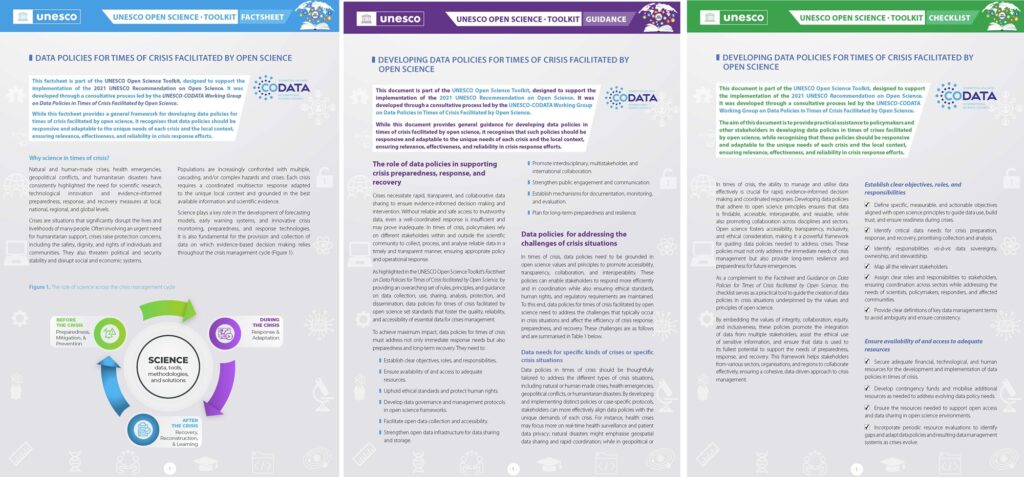 With the aim of contributing to the development of data policy pathways for crisis preparedness, response, and recovery, three companion resources on ‘Developing data policies for times of crisis facilitated by open science’ were launched on 4 June 2025 at UNESCO Headquarters in Paris. Comprising a Factsheet, Guidance, and a Checklist, these resources were designed within the framework of the open science principles found in UNESCO Recommendation on Open Science (2021) and developed as contributions to the UNESCO Open Science Toolkit.
With the aim of contributing to the development of data policy pathways for crisis preparedness, response, and recovery, three companion resources on ‘Developing data policies for times of crisis facilitated by open science’ were launched on 4 June 2025 at UNESCO Headquarters in Paris. Comprising a Factsheet, Guidance, and a Checklist, these resources were designed within the framework of the open science principles found in UNESCO Recommendation on Open Science (2021) and developed as contributions to the UNESCO Open Science Toolkit.
Coordinated by UNESCO and the CODATA International Data Policy Committee (IDPC), the Toolkit contributions were created to support institutions and scientific projects in developing data systems that are timely, interoperable, ethical, and trustworthy across data management plans, institutional boundaries, and jurisdictions for the preparedness, response, and recovery phases of crisis situations.
The Toolkit Resources
 The Toolkit contributions are developed to work as follows:
The Toolkit contributions are developed to work as follows:
- The Factsheet: a concise orientation for scientists, data experts, policymakers, and institutional leadership. It establishes the mandate, scope, and value proposition of adopting open science‑based crisis data policies while signposting alignment with the Sendai Framework for Disaster Risk Reduction and the UNDRR-ISC Hazard Information Profiles (HIPs) 2025 update.
- The Guidance: a structured playbook for policy co‑design across preparedness, response, and recovery across stakeholders, data management plans, institutions, and jurisdictions. It details the need to identify roles and responsibilities; legal bases and safeguards; interoperability and transparency requirements; ethics and duty‑of‑care; and pathways for whole‑of‑system adoption across digital and crisis preparedness borders.
- The Checklist: a practical readiness tool for teams. It supports an overview of what is required alongside assisting in preparing drills, gap analysis, and quarterly monitoring. Each item can be mapped to Sendai priorities and HIPs fields in platforms and standard operating procedures.
These toolkit resources are designed to help crises management partnerships apply open science frameworks within legally accepted safeguards for data collection, processing, sharing, and retention of data. They promote inter‑institutional and cross‑border transfers while ensuring data protection, confidentiality, and security. They give special attention to the FAIR and CARE data stewardship principles as well as the TRUST principles for digital repositories, emphasising the need for transparency towards the public, proportionality in data use, community engagement, and the duty of care – especially for vulnerable and at‑risk populations.
By providing a structured approach, these resources assist partners engaged in crisis mitigation with developing and aligning data policies for digital cooperation for reliable information shared among scientists, first responders, policymakers, and communities. They offer a pathway for data collaboration across disciplines, institutions, and sectors. This supports the co‑designing and documenting digital teamwork involving legal, technical, operational, and communications teams, reinforced (as appropriate) with cross‑border data‑sharing agreements and public transparency practices.
Data policies in times of crises should balance openness with responsibility, respecting sovereignty while also ensuring appropriate, reliable and actionable access to information. These UNESCO toolkit resources for developing data policies should also assist in developing clear governance frameworks for data processors and decision‑makers. Ultimately, the aim is to better inform communities, first responders, and policymakers.
The UNESCO guidance documents address the critical need to operationalise and test cooperation in data for preparedness as well as during real‑time crises, including health emergencies, disasters, and geo‑political conflicts. Framed within the broader context of the UNDRR Sendai Framework for Disaster Risk Reduction 2015–2030 and the ISC and UNDRR Hazard Information Profiles (HIPs): 2025 version, they contribute to the United Nations’ and global efforts to mitigate the impact of crises on persons and communities.
Next Steps and Action!
Following the successful launch of these UNESCO Open Science Toolkit resources, the project team is now moving towards operationalizing the guidance through the following measures:
- Data policies in context: developing context relevant data policies that address the needs of crises data management aligned with people, organizations, instruments, and hazards.
- Testing and validation: using the resources, particularly the Checklist, to run periodic drills, red‑team exercises, and after‑action reviews that will allow partners to capture lessons and further develop their cooperation.
To UNESCO-CODATA team is taking a number of steps to achieve these objectives.
- A proposal has been submitted to the UNESCO International Decade of Sciences for Sustainable Development (2024-2033): ‘Piloting the UNESCO-CODATA Toolkit Contributions on ‘Data Policies for Times of Crisis Facilitated by Open Science (DPs4Crises-Pilot)’.
- The Türkiye case study in CODATA’s ISC supported project ‘FAIR Data and Emergencies’ will organise a workshop in Ankara in November which will focus both on implementing the UNESCO toolkit resources AND exploring the role that the Cross-Domain Interoperability Framework (CDIF) can play to assist in mobilising and integrating data for disaster risk reduction.
- To find out more, come to the session in the SciDataCon component of International Data Week 2025, From Guidance to Practice: Implementing Open Science Data Policies in Crisis Situations (15 October, 14:00 AEST)
Feedback on how these crises management policy resources can be operationalized and further developed is warmly welcomed by the UNESCO-CODATA Project Team. Please share your comments with Francis P. Crawley, Chair, International Data Policy Committee (IDPC), Committee on Data (CODATA) of the International Science Council (ISC): francis@codata.org and info@codata.org
